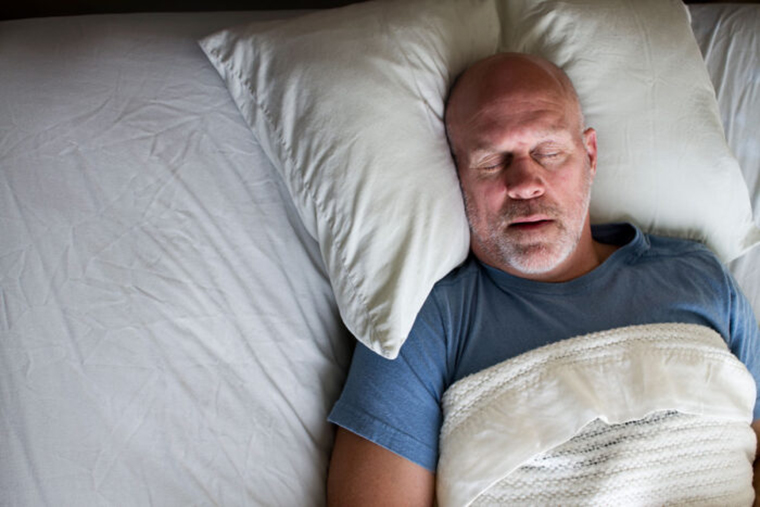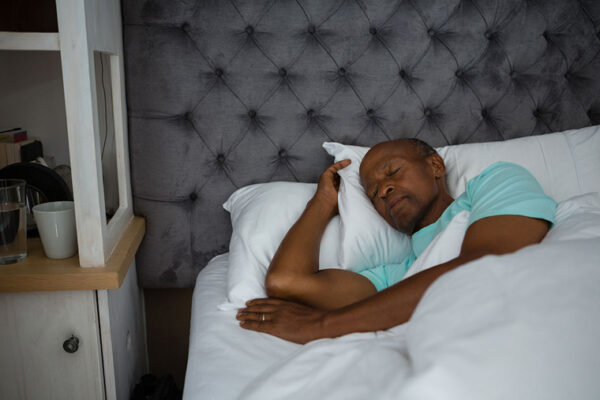A nerve-stimulation treatment for obstructive sleep apnea that originally was approved only for people with body mass indexes (BMIs) in the healthy range recently was extended to patients with BMIs up to 40, a weight range generally described as severely obese. A healthy BMI ranges from 18.5 to 24.9.
The expanded eligibility criteria for the treatment provide more sleep apnea patients with access to the increasingly popular therapy, known as hypoglossal nerve stimulation. However, new research from Washington University School of Medicine in St. Louis indicates that the likelihood of successful nerve-stimulation treatment drops significantly as a patient’s weight rises above a healthy range.
The study, which appears April 4 in JAMA Otolaryngology-Head & Neck Surgery, is based on a retrospective analysis of treatment success in 76 sleep apnea patients with BMIs of less than 35.
“Our study shows that the more overweight you are, the less likely it is that nerve-stimulation treatment will be effective in treating your sleep apnea,” said senior author Eric C. Landsness, MD, PhD, an assistant professor of neurology.
“I’m not saying that we shouldn’t put this device in patients with a BMI of 38 or 40. But my job as a physician is to help overweight patients make an informed decision, to better understand their odds of success and realize that the chances of it working for them may be a lot less.”
Obstructive sleep apnea is caused by relaxation of muscles in the mouth and throat when a person is asleep. Muscle slumping can cause a partial or complete blockage of airflow and oxygen supply, especially in people with large tongues, thick necks and narrow airways. Blockages may cause people with sleep apnea to stop breathing for seconds (sometimes more than a minute), until they startle themselves awake and gasp for breath, a cycle that often repeats through the night. Untreated sleep apnea can cause serious health problems, including excessive daytime sleepiness, headaches, strokes, irregular heart rhythms and other cardiovascular issues.
Sleep apnea most often is treated with a bedside continuous positive airway pressure (CPAP) machine, which maintains open airways via a breathing hose and tightly fitting face mask. CPAP machines are effective, but they can be loud and uncomfortable and are largely unpopular. About half of those who try the approach fail to stick with it.
To many patients, hypoglossal nerve stimulation looks like an appealing alternative to CPAP machines. The therapy is driven by a small, battery-operated device implanted just above the ribs. A small wire is run internally up the chest and into the jaw, where it connects to the hypoglossal, a nerve that controls tongue muscles responsible for keeping the upper airway open during sleep.
Each time the patient takes a breath, the device delivers electrical impulses to the hypoglossal nerve, causing the tongue to move forward just far enough to avoid the airway blockages that drive sleep apnea.
The first hypoglossal nerve-stimulation device (brand name Inspire) was approved by the U.S. Food and Drug Administration (FDA) in 2014 for use in patients with BMIs less than 25 whose moderate to severe sleep apnea has failed treatment with other, more established therapies. Since then, eligibility requirements have loosened, with the FDA now allowing the device to be used in patients with BMIs as high as 40 and Medicare providing coverage for patients with BMIs up to 35.
Landsness, a sleep researcher who treats patients with sleep apnea, was surprised by the changes in the eligibility criteria. To understand how the device performs in people of varying sizes, he and colleagues performed an independent evaluation using data from 78 people with BMIs up to 35 who received implants of the nerve-stimulation device at the Washington University Sleep Medicine Center from 2019 through 2023.
The primary study finding was that, overall, the device works. Three out of four patients showed significant improvement in apnea symptoms in the year following implantation. Most study participants experienced symptom reductions of at least 50%, with many showing dramatic reductions to near normal or mild levels of sleep apnea.
However, among overweight study participants with BMIs of 32 to 35, the results were less positive, with the likelihood of successful treatment estimated to be 75% lower than those of study participants with lower BMIs.
“Body mass index is clearly an important factor in predicting whether hypoglossal nerve stimulation will work for an individual patient,” Landsness said. “Our study shows an almost linear relationship between BMI and treatment success. For every unit of BMI increase over 32, the odds of successful treatment decrease by about 17%.”
Inspire is the only FDA-approved hypoglossal nerve-stimulation device available in the United States. The company also markets the device in Europe, Japan and other countries. About 50,000 patients worldwide have been implanted with it.
Implantation of a hypoglossal nerve-stimulation device is a relatively simple outpatient surgery. Among the biggest concerns for patients are in terms of money and time. Landsness estimates that the therapy can cost from $50,000 to $100,000 out of pocket without insurance and take a year to be fully optimized.
“We have patients coming to us who really want this treatment, because they view it as a life-changing alternative to CPAP,” Landsness said. “It certainly can work for some people, but we don’t want to recommend it to patients if there’s a chance their BMIs will affect the device’s usefulness.”
Patel R, Wang H, Jamro E, Lindburg M, Jackson R, Malhotra R, Lucey B, and Landsness E. Response to hypoglossal nerve stimulation changes with body mass index and supine sleep. JAMA Otolaryngology-Head & Neck Surgery. April 4, 2024. DOI: 10.1001/jamaoto.2024.0261
Preparation of the manuscript was supported by the Washington University Institute of Clinical and Translational Sciences, grant UL1TR002345 from the National Center for Advancing Translational Sciences (NCATS) of the National Institutes of Health (NIH) and K08 NS109292-01A1 from the National Institute of Neurological Disorders and Stroke (NINDS).
This study is not part of a clinical trial. The authors have no conflicts of interest to declare and no off-label investigational use. The content of this paper is solely the responsibility of the authors and does not necessarily represent the official views of the National Institutes of Health (NIH).
About Washington University School of Medicine
WashU Medicine is a global leader in academic medicine, including biomedical research, patient care and educational programs with 2,900 faculty. Its National Institutes of Health (NIH) research funding portfolio is the second largest among U.S. medical schools and has grown 56% in the last seven years. Together with institutional investment, WashU Medicine commits well over $1 billion annually to basic and clinical research innovation and training. Its faculty practice is consistently within the top five in the country, with more than 1,900 faculty physicians practicing at 130 locations and who are also the medical staffs of Barnes-Jewish and St. Louis Children’s hospitals of BJC HealthCare. WashU Medicine has a storied history in MD/PhD training, recently dedicated $100 million to scholarships and curriculum renewal for its medical students, and is home to top-notch training programs in every medical subspecialty as well as physical therapy, occupational therapy, and audiology and communications sciences.
Originally published on the School of Medicine website



